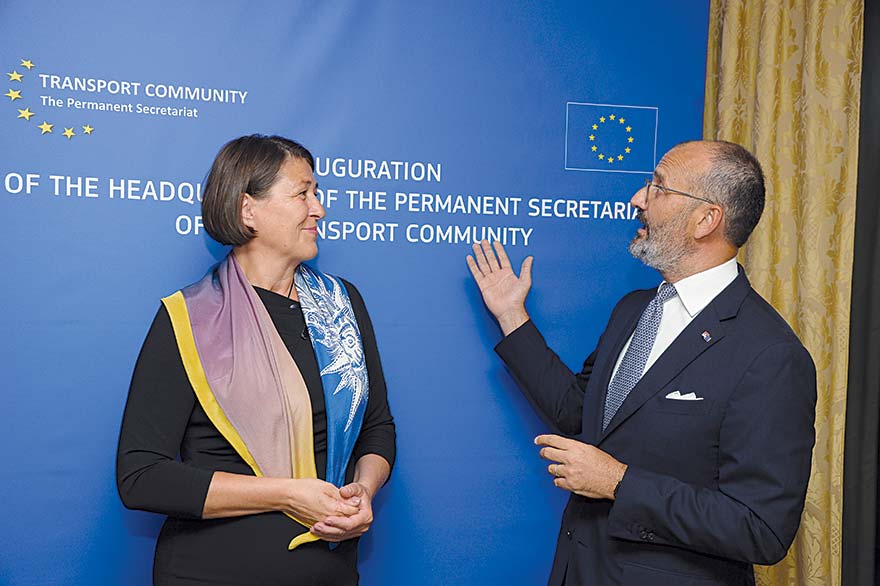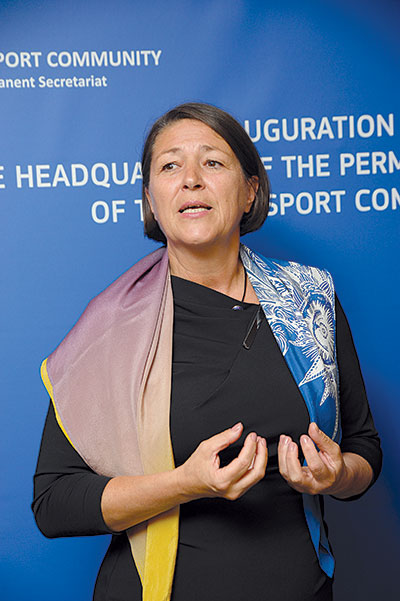The Community Treaty will open up the region for business opportunities, while also opening travel perspectives for citizens of the Western Balkans and the EU. This alignment to the rules of the European transport market thus represents an important step towards EU accession
The official opening of the Transport Community’s Secretariat in Belgrade is important for Serbia and the region in both symbolic and practical terms. It is yet another step in moving forward on the regions’ path towards the EU, but should bring palpable changes in the way businesses can connect, and people can travel. It is also about security, which is often a painful topic in a region where many people lose their lives in traffic. This month we spoke with Violeta Bulc, European Commissioner for Mobility and Transport.
“The Transport Community provides a stable legal framework aligned to that of the EU, to push for greater connectivity,” says Bulc. Ultimately, she notes, “this alignment to the European transport market’s rules is a step towards accession. When you become a Member State, there will be no need for transition”.
What does the establishment and work of the Permanent Secretariat of the Transport Community mean to the advancement of mobility in the Western Balkans? And how symbolically important is the opening of the Secretariat?
First of all, the EU and Western Balkan countries should be very proud of this achievement. The location of the Transport Community’s Secretariat in Belgrade is very important not only for Serbia but for the entire region. The Transport Community is helping to initiate long-awaited transport reforms, which will lead to better quality services across the region.
It is paving the way for better use of funding to build better transport infrastructure and reconnect the Western Balkans with the rest of Europe, where the region belongs. I would invite all stakeholders to go beyond and see the seat of the Western Balkans Transport Community as a regional centre of excellence in transport. It should become an inspiration for what we can do when we work together closely.
Its ultimate goal is to promote peace and reconciliation in the region, and of course to bring the Western Balkan countries a step closer to the EU. It is also a priority that this is the first international organisation in Serbia.
What impact should the opening of the Secretariat have when it comes to the better utilisation of financial assistance provided to the Western Balkans by the European Union? Do you consider that projects in this area are progressing well in Serbia?
The most crucial things for financial engagements, especially instruments for transport, are predictability and well-prepared projects. We have worked with our Western Balkans partners over the last five years, first in order to extend the EU’s core transport network to this region, identify priority projects and start their implementation.
The EU Investment Framework for the Western Balkans has already made 760 million euros available in direct grants for infrastructure projects, and – like grants – these funds will not have to be paid back. Combined with loans and private investments, the leverage effect is expected to exceed three billion euros.
We are now accelerating work with the Transport Community and focusing on projects of regional interest. At the most recent Western Balkans Summit, in Poznan, leaders approved nine regional projects, including three submitted by the Transport Community Secretariat, and additional funding for them. The goal of the latter three projects is to unblock administrative barriers and physical bottlenecks at the borders so that trucks don’t spend 10 to 15 hours awaiting clearance at each border crossing.
I would invite all stakeholders to go beyond and see the seat of the Western Balkans Transport Community as a regional centre of excellence in transport. It should become an inspiration for what we can do when we work together closely
We’ve also started working to remove dangerous spots along the major roads of all Western Balkan countries, through targeted road upgrades along key corridors covering several partner countries. Then there is rail – the most efficient and green mode of transport, but one that is under-used due to inefficient rail operations and poor infrastructure in the Balkans.
The Permanent Secretariat strongly focuses on the rail, with the setting up of a regional railways action plan to boost this mode of transport. This inclusive approach, for which I have pushed, will lead to better and faster results compared to isolated initiatives.

Thus, in order to accelerate investment that the region can absorb and capitalise on, the Secretariat will focus on capacity building, transposition of the EU acquis, cross-border projects and the promotion of matured projects with the investment community.
What kinds of benefits can the transport community bring to transport companies and firms operating in the region that rely on this type of freight transport?
Let me stress that, through the Community Treaty, WB6 countries are fast becoming a part of the single EU transport area and EU single market. That means that we now share common values and priorities. Firstly, transport connectivity, efficiency and reliability are key elements of successful legislative systems. Companies in Serbia and further afield will see many benefits – I’m very confident about this. Secondly, more stable and predictable transport policy and investment framework will help attract new investors from within the region and elsewhere, giving a boost to economic growth.
Business opportunities, alongside travel opportunities for citizens of the Western Balkans and the EU, are key results that we expect from the Community. Let me stress that my ultimate aim is for this alignment to the rules of the European transport market to represent a step towards accession. When you become an EU member state, there will be no need for transition. Thirdly, after the regulatory frameworks are aligned, stakeholders will be able to act on an equal footing within the common EU transport market
In your opinion, why is it important to improve the mobility of people in the Western Balkans?
Mobility is about building bridges and removing obstacles – physical ones, but not only them. Well-connected transport networks, both within the region and with neighbouring EU member states, are crucial to sustainable economic growth in the Western Balkans and beyond. Improved connections not only facilitate trade and open new opportunities, but they also bring people together. The Transport Community provides a stable legal framework aligned with the EU’s in order to push for greater connectivity.
For example, our focus on road safety is saving lives in the region. Our focus on green transport is bringing a reduction to zero of pollution and emissions that directly impact on human health and quality of life. Last but not least, digitalisation, which is one of the core horizontal objectives, creates conditions for more inclusive and sustainable mobility as a service.
Serbia has witnessed a significant increase in the number of deaths on the roads this year. To what extent will the goal of achieving a zero mortality rate by 2050 be on your agenda for the Balkans?
Indeed, as I mentioned before, managing negative externalities from transport is a moral duty and a political obligation. So many lives are lost every year as a result of road accidents, many of which could have been avoided. Road safety is a top priority for the EU, and we continue to work hard to achieve “vision zero” – no deaths or serious injuries on European roads by 2050.
This was also placed on the agenda for the Western Balkans in Ljubljana at the 2018 TEN-T days when all ministers of WB6 countries signed the declaration on road safety and ‘Vision ZERO’. At the Poznan Summit in July, we put forward additional grants, via the Western Balkan Investment Framework, to improve road safety. In parallel, the Transport Community Secretariat has set up a technical committee on road safety, which first met in Podgorica on 2nd October.
The role of this committee is to plan targeted measures for each of the regional partners, which are aiming to align their legislation, but also their approach to road safety, to that of the EU. Through these actions, the Transport Community will contribute to reducing fatalities and serious injuries, to achieve ‘Vision ZERO’ in the Western Balkans.
The Permanent Secretariat focuses strongly on railways, with the setting up of a regional rail action plan to boost this mode of transport. This inclusive approach, for which I have pushed, will lead to better and faster results compared to isolated initiatives
Around 70 per cent of investment in transport in the EU is being directed towards railways during the 2014-2020 period. Will, your focus in the region, also be directed in this way – given that railways are in very poor condition in many countries, including Serbia?
It is true. Our investments focus on rail, as it has the potential to become sustainable as an alternative mode of transport both for passengers and freight. This priority is also prominent in our cooperation with the Western Balkans. We came up with a regional rail strategy at the Poznan Summit that will now be managed, with the help of the TCT Secretariat, to tackle rail issues jointly.

Rail infrastructure was a priority under my mandate and will remain so in the new Commission. We count on railways to take a large part of the freight traffic away from roads. That’s why we are aligning all freight conditions with the TEN-T corridors, which need to be completed by 2030.
We also often encounter unsecured level-crossings in Serbia. How should these points be secured according to new European standards?
The Permanent Secretariat has already addressed the question of safety at level-crossings as one of the priorities for 2020. The issue in Serbia and the rest of the region is that many accidents are taking place at the so-called “unauthorised” level crossings and due to a misperception of the dangers by road users.
In the coming months, the Permanent Secretariat is to set up a joint technical committee that will include road and rail safety experts, as well as police authorities to propose specific solutions. EU member states and infrastructure companies have already agreed to share their experience in the field. I believe that such coordinated action is the key to improving the situation.
A large part of your portfolio relates to innovation and digitalisation. To what extent can countries in the region approach the EU in this field?
This is clearly a priority. If these new technologies are not properly considered when planning new infrastructure, the “connectivity” gap between the Western Balkans and the EU may severely increase, instead of being reduced. I have always insisted on this point with all my interlocutors, and I can also hear it clearly expressed by your leaders.
I am inviting the Western Balkan partners to align their innovation and digitalisation strategy with that of the EU and to ensure that standards are implemented correctly in their respective legislations. New solutions make sense only if all partners are using the same standards. Once again, the role of the Permanent Secretariat will be crucial in ensuring that this is adequately considered in the region.